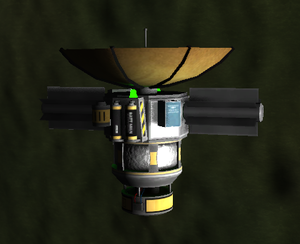Difference between revisions of "Ion-Powered Space Probe"
THEMUNROVER (talk | contribs) m (Added stock craft link box thing at bottom of page) |
(+description) |
||
| Line 9: | Line 9: | ||
The probe is equipped with three [[sensor]]s: A [[2HOT Thermometer]], a [[Double-C Seismic Accelerometer]], and a [[GRAVMAX Negative Gravioli Detector]] | The probe is equipped with three [[sensor]]s: A [[2HOT Thermometer]], a [[Double-C Seismic Accelerometer]], and a [[GRAVMAX Negative Gravioli Detector]] | ||
| + | |||
| + | == Description == | ||
| + | {{Quote|This small probe may look cute and unimpressive, but once it deploys its long-range antenna, it looks pretty much the same. Its Ion engine is very efficient for a spacecraft this small, so it can go very far indeed, as long as something helps it get into orbit first, of course.|Squad}} | ||
{{Stock craft}} | {{Stock craft}} | ||
[[Category:Stock craft]] | [[Category:Stock craft]] | ||
Revision as of 12:19, 8 December 2014


The Ion-Powered Space Probe is a stock probe which utilizes the PB-ION Electric Propulsion System ion engine.
This probe requires a launcher, as the ion engine doesn't provide enough thrust even to leave the ground. The Z-MAP Satellite launcher is capable of bringing this probe into orbit.
Two PB-NUK Radioisotope Thermoelectric Generators, mounted on opposite sides, are its only electric generators. They are buffered by four Z-100 Rechargeable Battery Packs. As the generators aboard don't generate enough electricity and some is needed to run the command module, the ion engine can only run up to 10% of its maximum thrust. This limits the maximum force applied by the engine to about 50 N or completely dry an acceleration about 0.08 m/s².
The probe is equipped with three sensors: A 2HOT Thermometer, a Double-C Seismic Accelerometer, and a GRAVMAX Negative Gravioli Detector
Description
| “ | This small probe may look cute and unimpressive, but once it deploys its long-range antenna, it looks pretty much the same. Its Ion engine is very efficient for a spacecraft this small, so it can go very far indeed, as long as something helps it get into orbit first, of course. — Squad |
” |